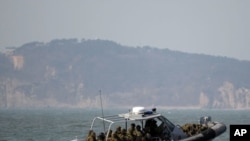South Korea went ahead with an artillery drill Monday near a disputed maritime border despite an unusually explicit threat by North Korea to retaliate by shelling inhabited islands in the Yellow Sea.
Officials in Seoul say the morning exercise was routine and included the firing of self-propelled howitzers and mortars. Attack helicopters also joined the exercise on the western frontier islands.
A spokesman for South Korea's Joint Chiefs of Staff says no shots were fired towards the Northern Limit Line, which is the disputed maritime border.
Pyongyang Warns Seoul
North Korea, the previous day, warned inhabitants of the five islands to evacuate to avoid its possible retaliatory shelling.
And in a message, carried by state radio and the official news agency just hours before the South Korean exercise commenced, Pyongyang termed the drill “a clear declaration of war” against the North.
The North Korean announcer says if South Korea fires recklessly, then it “will not escape punishment thousands-fold more severe than the shelling of Yeonpyeong island.”
North Korea, on November 23, 2010, in response to a South Korean military exercise, bombarded the island, killing four people.
South Korean officials say residents of the five front-line islands were advised to take shelter in safe zones before its forces began the shelling exercise. The officials also say no reaction has been observed from the North's military, and there are no signs of any extraordinary troop movements.
US to Join South Korean Exercises
South Korea and the United States this week are also holding an anti-submarine drill in the Yellow Sea.
Beginning next Monday, they are to commence the first of two annual large-scale war games involving thousands of soldiers from both of their militaries.
Western intelligence analysts say the recent change of leadership in Pyongyang makes it difficult to assess the seriousness of the latest North Korean threat. They say that is because of a lack of a track record for the new leader, Kim Jong Un, compared to his late father, Kim Jong Il. They also note there is scant intelligence about the leadership dynamics in Pyongyang since the elder Kim's death in December.
Professor Kim Yeon-su, a specialist on North Korea at South Korea's National Defense University, says he is not overly concerned about the latest warnings from Pyongyang. He points out they are not being issued by the highest entities in the North so they should not be exaggerated as a major threat to the South.
The professor says their timing is likely tied to the talks in Beijing later this week between the United States and North Korea.
U.S. officials say those discussions are to gauge Pyongyang's sincerity about its expressed desire to return to six-nation talks on its nuclear programs.
Those talks, involving both Koreas, China, the United States, Japan and Russia, have not been able to resume since 2008, when Pyongyang pulled out.
The two Koreas have no diplomatic relations and no peace treaty. A 1953 armistice implemented a truce following a devastating three-year civil war.




